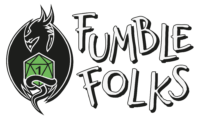Whether you’re about to chase after Vecna or Tiamat, Session 0 is the most important place to begin.
So, you’ve got your friends (or some internet strangers) together, you’ve organised your first session, but no one knows what they are doing!
In a Session 0, we need to learn some important things about our party; who they want their characters to be, what the players boundaries are to ensure everyone feels safe, and what kind of game they would like to play—be it action packed dungeon adventures, political intrigue or investigating mysteries. Let’s find out how from here.
What is Session Zero?
Session Zero is where you sit down with your players to figure out what they want to play based on the type of game you are running and the characters they will create within it. It’s no use having a party that is RP (Roleplay) focused if they are going to be slogging through troll innards 90% of the time. Setting the expectations for your game is important, it helps make sure that everyone has the opportunity to have fun.
Setting the tone
In this section, we are going to talk briefly about the first important conversation to have in any TTRPG game, whether that be campaign or one-shot: Boundaries.
Talk beforehand; discussing the tone of the game you are looking to run, and any topics that your players might not be comfortable with, leads to a better game for everyone.
Remember, TTRPG’s – whether that be D&D or any other systems – are for everyone. There is no space for prejudice in our community.
To help facilitate this, there are a few questions that can be asked at this stage. I typically boil mine down to:
1. What kind of game do you like to play?
2. What are some of the themes you would like to explore if possible?
3. Do you have any triggers or topics that are not to be broached?
By following a simple list like this, you can help to get some of the more delicate topics out of the way early. For most people, it will be obvious subject matter and themes, but some might have more particular issues like claustrophobia or other phobias that – while you may not believe them to be a big deal – could endanger your players accidently. It is always better to be safe than sorry. It is also helpful to discuss your own ‘No Go’ topics, helping to protect yourself, not just your players. Everyone should always feel safe and have fun at the table.
Knowing Boundaries
There are also wonderful tools online such as X-Card by John Stavropoulos or Lines and Veils by Ron Edwards. These tools allow you to easily integrate these checks before and during a game without it being obtrusive. Personally, I like the use of X-Cards, but I know my party extremely well as we have been playing for years and, as such, most of the topics that would be a trigger are naturally avoided.

Creating the Party
Here is where we get to the fun bit: making the characters your players will explore your world with! For many of us already neck-deep in the hobby, making characters that we might never play is something we do for fun, so making your first with a group is an amazing experience—if a little daunting.
The first thing you will need is a Character Sheet. There are many different character sheet designs depending on your system, but most are fairly similar. For the sake of this example, we are going to be using the world’s most popular TTRPG, Dungeons & Dragons 5e.
There are typically two ways to plan a party, I refer to these as The Squad and The Vagabonds.
The Squad
This group works together, figuring out Party Composition in as balanced a way as they can, asking what the party needs to work effectively. This can lead to excellent synergy and teamwork across the group, with plans for how to deal with situations that might come up in the game/campaign.
The Vagabonds
This group makes whatever characters they want to play, and worries about how to work together later! The players will have a more intuitive connection to the characters they create and will learn to improvise in tricky situations.
Both of these groups are completely valid ways of playing, with their own strengths and weaknesses. While The Squad may be balanced for most situations, it can sometimes lead players to take up a role that they don’t enjoy simply so they have a healer or a heavy-hitter in the party. Similarly, Vagabonds who make the characters they want to play may find that they have no good solutions to problems, as 4 wizards can’t knock down or pick a locked door.
This is what makes Session Zero important: discussing with your players the kind of setting they are going to be experiencing, players tailoring characters that best fit the game, while also enjoying the benefits of cohesion by being able to discuss things together before the game itself gets underway.

If you still aren’t entirely sure of those roles, and your players aren’t either, here is a small breakdown of what the classes typically do:
Artificer
Smart and practical, these are your mad scientists and engineers. They are referred to as Mid-casters or Support Casters, able to deal damage but also heal if needed, with a plethora of utility options to back up players on the front line of combat with spells and gadgets.
Barbarian
Whether muscled like Hercules or dexterous like Achilles, Barbarians are rage-fuelled damage made flesh. They are referred to as Tanks – able to deal damage and get upfront and personal with whatever enemy comes their way without fear.
Bard
Masterful weavers of words, contortionists or melody-makers, these individuals melt the hearts of all who surround them – and not always in a nice way. Referred to as Mid-casters or Support Casters, they can deal and heal damage, control the enemy and inspire the party.
Cleric
Characters of faith, these individuals spread the word of their God – whether that be kindness or deceit – to ferment peace, education, war or something in-between. They can be Tanks or Mid-casters, but are stereotypically used as the party healer. The variety of playstyles allows them to fill a number of roles.
Druid
Those touched by the magics of nature, Druids can manipulate themselves or the world around them to achieve their goals. Known for turning into beasts and manipulating the weather, they can be Tanks or Mid-casters, able to fill a number of roles depending on the play style and also heal if needed.
Fighter
Whether with spear, crossbow or sword and shield, Fighters control the battlefield at all times. They can be Tanks or DPS (Damage Per Second), able to absorb and/or dish out massive amounts of damage, while also controlling those in their space.
Monk
Fists, elbows, knees and feet are the most reliable weapons, and these individuals have honed them to a killer edge. Referred to as DPS (Damage Per Second), these nimble damage-dealers have numerous tools and tricks to stop the enemy from getting their way. Who needs weapons when you are a weapon?
Paladin
Pious warriors of faith, more militant in their beliefs than Clerics, they hunt down those considered an affront to their gods, whether that be the Undead, Monstrosities or other Mortal Races. Often the most heavily armoured in the party, they are referred to as Tanks, able to deal damage and be upfront and personal with whatever enemy, without much fear of dying – with healing utility if needed.
Ranger
Dextrous and collected, these individuals are in tune with their surroundings, being well aware of who or what would be coming their way. They are referred to as Control, able to corral enemies and cause massive damage from a distance, and—of course—your go-to if you want animal pals in your games session!
Rogue
Using subterfuge and stealth for personal gain or blood money, these individuals are often the last things their enemies ever see. Referred to as ‘Skill Monkeys’, they excel at tasks outside of combat, but—though not the toughest fighters—are also capable of handing out massive DPS (Damage Per Second) to go alongside tools to stop the enemy from getting their way.
Sorcerer
Born with magic in their blood, these individuals are potent spellcasters who manipulate the material plane with ease. Ranged Casters, they are dangerous from a distance, but often very fragile—wanting to stay away from the bloody dangers of upfront combat.
Warlock
Funnelling magic from powerful, other-worldly beings, these versatile individuals get immense power, for a price. Making a pact/deal with a Patron, they gain newfound abilities but are then beholden to the often nefarious whims of their masters. Fragile and lacking healing abilities, they are sometimes versatile enough to fulfil most roles.
Wizard
Unlike other spell casters, wizards learn their craft from books and need to be highly intelligent to do so. Manipulating the material plane to their whims, these individuals have studied the Arcane arts with obsession, reaping the rewards of their dedication. Mainly Ranged Casters, they are dangerous from a distance, but notoriously frail, they are capable of high-damage output with the spells at their disposal.
For more information on these classes, go to D&D Beyond or consult a physical copy of the Players Handbook.
Origins/Races
The other major decision that a player will make is what the Origin or Race of their character will be. This can be Elf, Human, Dwarf, Gnome, Dragonborn, Tabaxi or any other weird and wonderful creation you can come up with. All of the listed Origins are from the Player’s Handbook, and are some of the most common choices because of it. However, while this can influence what Class your character is, there is nothing restricting anyone from being anything. Want to be a 3ft Gnome barbarian? Scream your little heart out! Want to be an Orc that values a book over a beer in their pursuit to be a wizard? Don’t let anything hold you back!
Stats
Next up is the character’s Ability Scores. This is broken down into 6 categories in 5e: Strength (STR) Dexterity (DEX), Constitution (CON) Intelligence (INT) Wisdom (WIS) and Charisma (CHA). The higher the number of each ability, the better the person is in that area.
There are 3 ways that you can determine what the specific stats of these are:
- Standard array – The most commonly used (and my recommended) stat array, allowing for a balanced character
- Point Buy – Many players prefer this system; it allows the manual placement of points, but can be a bit intimidating for new players.
- Rolled – This is the wild card, rolling 4 D6, dropping the lowest and keeping the combined total. This can be amazing, giving you an 18 in a stat, or terrible, with a 6 (10 is average for most intelligent races)
I recommend Standard Array for the first few characters; it helps to keep things simple.
Each of the 6 stats lend themselves to different classes, so keeping the class in mind when placing them is important, though some people love the chaos of being bad at their class, like a clumsy Rogue with 8 in Dexterity.
Back-Story
Finally, we come to personality. This is what makes your character unique, and is often tied into their Backstory. What made them an adventurer? This can be from a premade selection in the Backgrounds sections of D&D releases, or from the minds of you and your players (though I recommend premade Backgrounds such as Courtier, Criminal or Acolyte for now). This should help flesh out your character with some personality, and make them not just unique, but someone a player can connect to. This way, you’ll have more immersion in the roleplay element of the game you are preparing for. This can be worked out individually, with the GM, or together with other players, and will set you up for the game rather than putting it all together as you start the adventure.
Ready for Session One
With that, the most complicated parts of a Session Zero are covered, and hopefully you have a better idea of how to put your party together. While learning how to do things on traditional paper is useful, with character-makers like D&D Beyond, making a character has never been easier, though you may need to buy the content through them if you want access to all the newer, fancier subclasses (We will get to those here).
We hope this will help you, and steer you in the right direction for adventures where everyone knows where each other stands, feels comfortable, prepared and ready to cause utter chaos in the games to come!
* We are affiliated with DriveThruRPG, so if you click this link you will be directly supporting Fumble Folks!
How to Support Fumble Folks
Hi and thank you for reading 15+ Great Gift Ideas for Geeks and Nerds! If you like what we do and wish to support Fumble Folks, here are a few ways you can do that:
- Follow us on our social media platforms. Find the links here: linktr.ee/fumblefolks
- Join our Discord Server and help our community grow!
- Join our Patreon and pledge the low price of a coffee every month. This will enable us to grow and do bigger and better things with Fumble Folks. Check out the Tiers we offer on Patreon or check out our other blog post here (coming soon).
- Listen to the Rapid Riders on Spotify or come and watch us live and give us that all-important Subscription on Twitch. Amazon Prime users get 1 free Prime Sub a month to use on your favourite Twitch creator, so use it wisely!
- Click on our Affiliate Links! We have been very lucky to be affiliate with a few companies including EMP, Hero Forge, iwantoneofthose.com among others. Clicking these links helps us as we get a small commission if you purchase anything, but won’t change anything for you. Win/win!
Above all, thank you for reading and stopping by! Any support is so much appreciated. Here’s to the future of Fumble Folks!
Recent Posts
- Denizens and Oddities Kickstarter Live
- Denizens, Oddities, and an overdue update!
- 2024 CRIT Award Winners!
- We are at Dragonmeet 2023: what you need to know!
- Mastering D&D 5e Character Creation: The Ultimate Guide to Crafting a Perfectly Balanced Character for Total Success
Archive
- November 2024
- October 2024
- November 2023
- October 2023
- July 2023
- May 2023
- January 2023
- December 2022
- October 2022
- August 2022
- June 2022
- April 2022
- January 2022
- December 2021
- November 2021
- October 2021
| M | T | W | T | F | S | S |
|---|---|---|---|---|---|---|
| 1 | 2 | 3 | 4 | |||
| 5 | 6 | 7 | 8 | 9 | 10 | 11 |
| 12 | 13 | 14 | 15 | 16 | 17 | 18 |
| 19 | 20 | 21 | 22 | 23 | 24 | 25 |
| 26 | 27 | 28 | 29 | 30 | 31 | |
